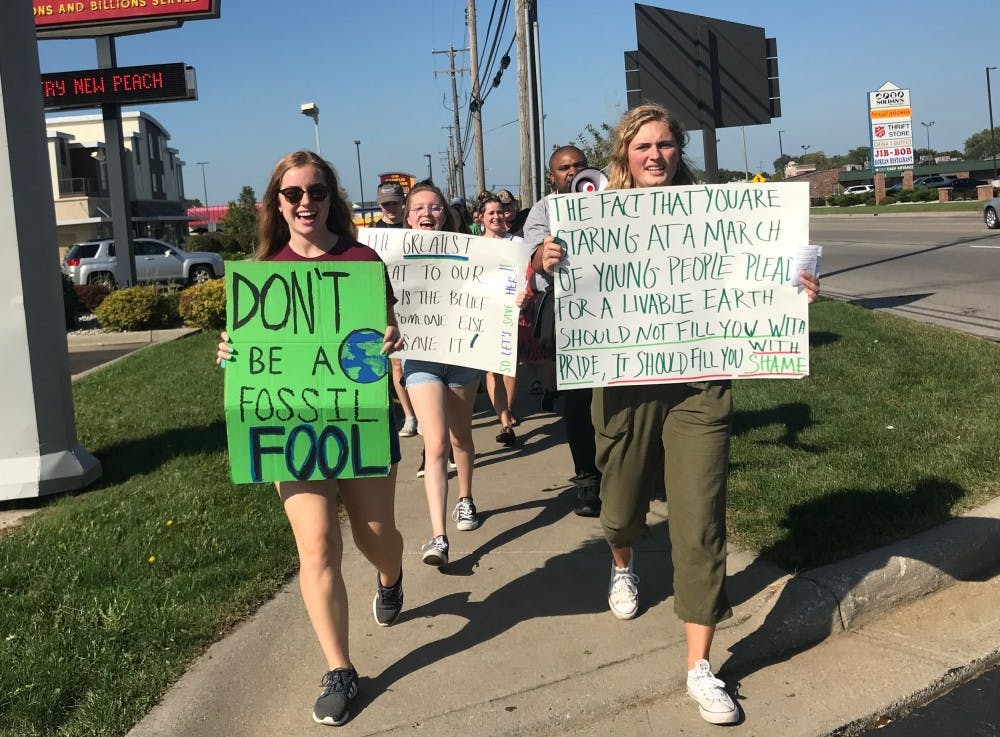CMU participates in global climate strike, community demands action
“Our house is on fire” is the rallying sentiment as millions of protesters gather worldwide to demand political, international action against climate change. This movement, "Fridays for the Future," was spearheaded by 16-year-old environmental activist and Nobel Peace Prize winner Greta Thunberg.
At Central Michigan University, the Sept. 20, 2019 Global Climate Strike teach-in took place in the Bovee University Center Rotunda, followed by a march down Mission Street later that afternoon.
“If we do not change our ways, there are going to be significant environmental shifts,” CMU President Bob Davies said. “How do we continue to thrive as a human population with those shifts? It’s going to affect our water supply, our food supply, the way we travel and transport, our communications. It will be the basis of how we think, operate and go forward.”
The CMU strike was organized by Comstock Park sophomore Sam Racalla and Vice President and Chief Diversity Officer A.T. Miller through the Center for Inclusion and Diversity. The event’s guest speaker, environmental consultant Thomas Rohrer, spoke about the significance of climate change and why it should be addressed urgently.
Organizations such as the Mount Pleasant Citizens’ Climate Lobby (CCL), the New America Project and the CMU Sustainability Coalition set up tables around the rotunda and shared information with attendees.
“I have the old-fashioned value that we should leave the world better than we found it, not worse,” CCL Group Leader Marie Koper said. “It was very clear that our environment and climate is in danger. I have grandchildren, and I’ve had the benefit of enjoying a long life on a beautiful planet that’s just right for us and is fascinating and gorgeous. The thought of leaving a threatened planet to my grandchildren just gives me goosebumps.”
The numbers - rising sea levels, carbon dioxide in the atmosphere and global temperatures - are not new to the scientific, academic and environmental community, but the movement is growing out of concern for the future of the planet.
“It’s not hope (driving the movement), it’s ‘if it doesn’t happen, we’re going to be (expletive),’” Midland junior Emily Kreusch said. “I have hope that we’re going to make it work, but it’s not going to be a hopeful scenario.”
The march drew more than 50 demonstrators from the university and Mount Pleasant community. Protesters carried signs like “if we don’t fix the climate crisis, there will be no more baby pandas” and yelled chants such as “no more coal; no more oil; keep the carbon in the soil.”
“About 3 million people are expected to strike today - that includes us,” Racalla said to Central Michigan Life, in between leading and chanting “climate justice” to the group. “I am deeply, deeply proud to be a part of what the youth have been able to pull off today. But it also makes me sad and angry that we, who are scared for our future, are still in high school and middle school and college. Why are we the ones needing to hold governments accountable?”
The main goal of the global strike is to raise climate change awareness and reduce fossil fuel emissions, which contribute to rising global temperatures. It’s not the first to call to action and it’s far from the last, but as Koper said, “cynicism is a luxury.”
“We remember the major events, the major tipping point, but to get to that event we need to have a lot of slow and steady steps,” Davies said. “This is probably one of those steps. Will it make a difference? Probably. Will it make a difference tomorrow? No. But we've got to keep plodding away.”







